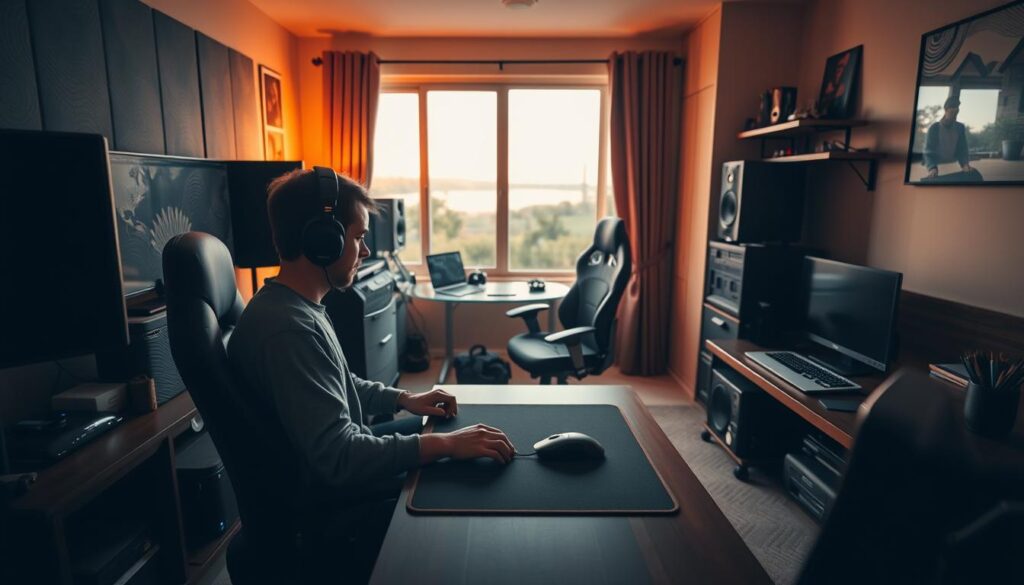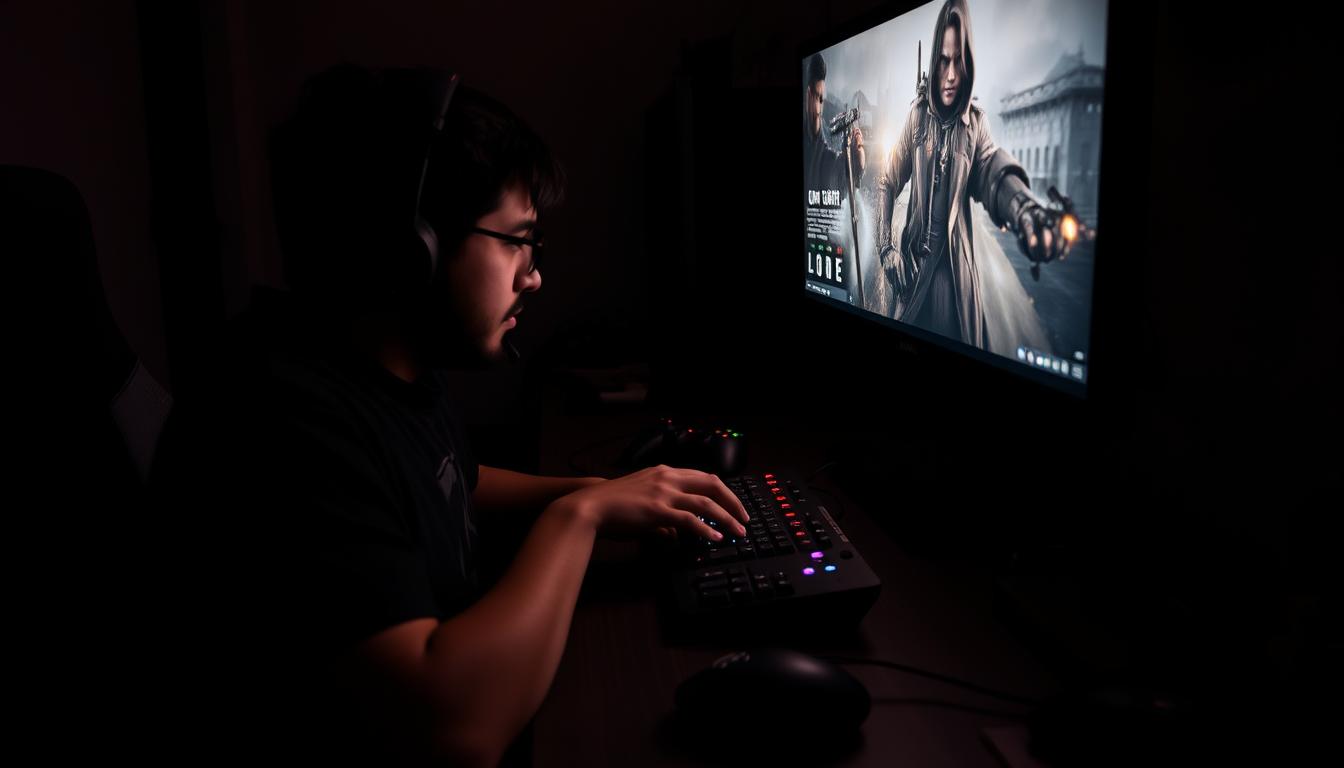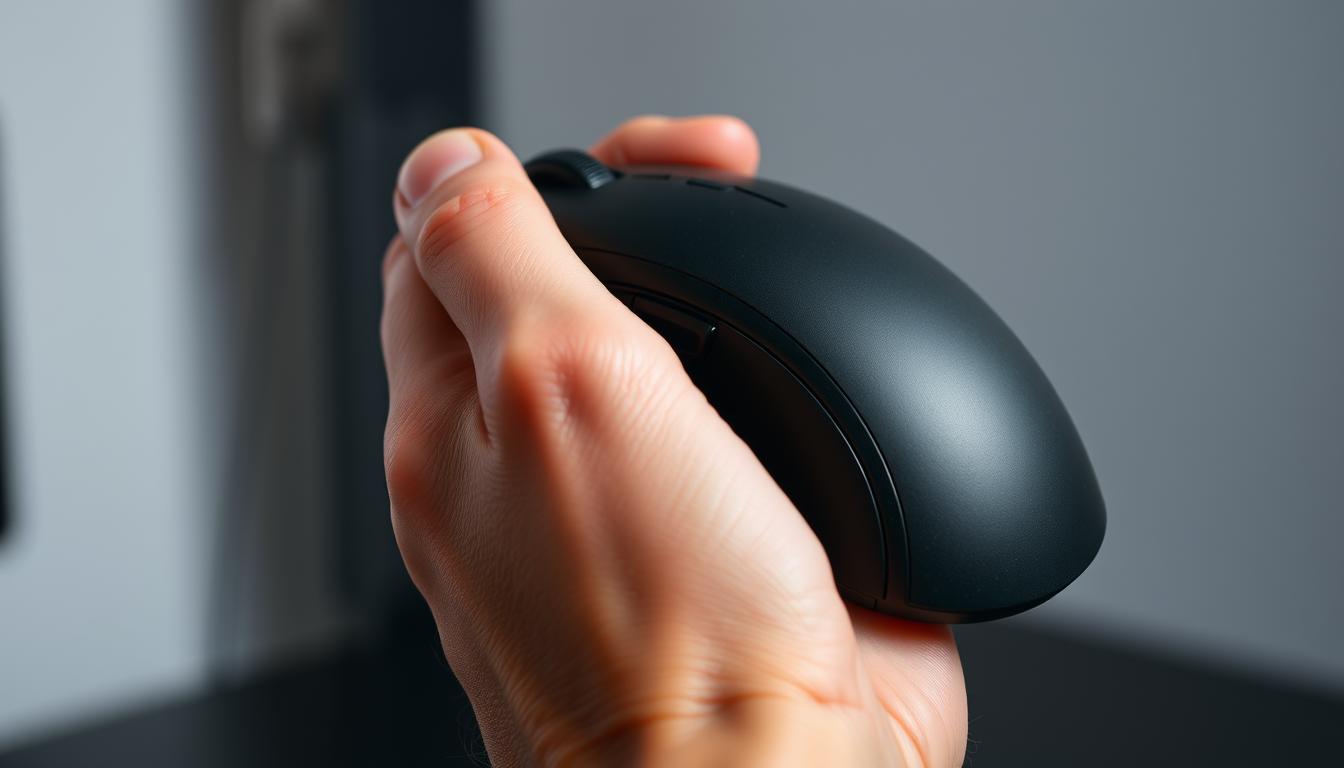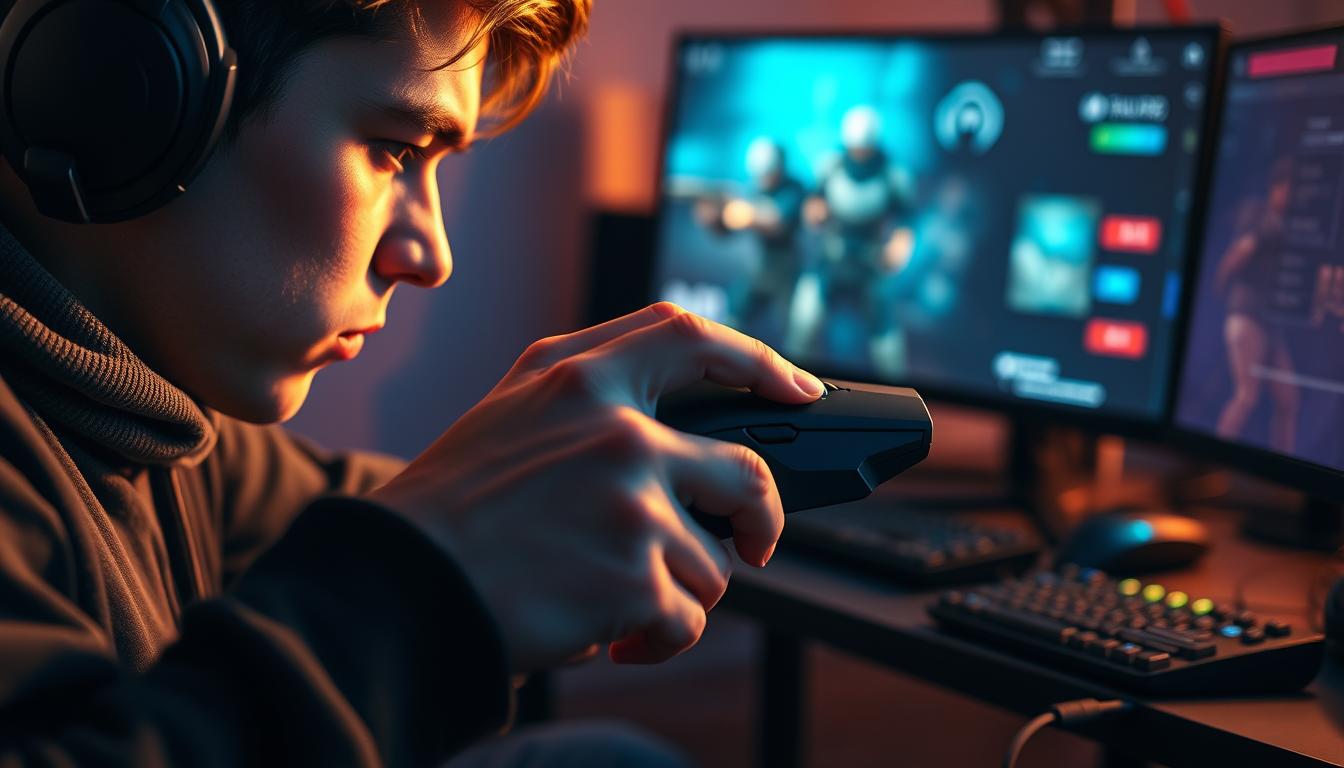Anúncios
Ever thought about how your hearing might change your gaming skills? In FPS games, left-handed players face two big challenges: auditory sensitivity and aim control. The link between hearing and gaming is often missed, but it really matters. It can change how these players do in quick games.
This article looks at the special problems left-handed FPS players have. It shows how hearing issues might mess up their aim and gaming fun.
Anúncios
Introduction to Auditory Sensitivity in Gaming
Auditory sensitivity is key in gaming. It makes players more aware of sounds, which can impact focus and immersion. Many gamers use sound to make important decisions, showing its role in sensory processing.
In action video games, sound cues are crucial. For those with auditory sensitivity, these sounds might be too much. This sensitivity can either improve or worsen a player’s ability to react to audio cues.
As gaming technology advances, knowing about auditory sensitivity is more important. It helps players understand how sound affects their actions and aiming. This knowledge can help improve performance in fast-paced games.
Anúncios
Understanding Aim Control Mechanisms
Aim control is key in gaming, especially in fast games like first-person shooters (FPS). It involves how well a player can aim at targets. Perception, decision-making, and motor skills all play a part in this.
For top FPS performance, quick reactions to visual and sound cues are crucial. Players need to think fast and move accurately. This shows how thinking and physical actions work together in aim control.
Learning about aim control can help us see how sound affects FPS games, especially for left-handed players. It helps us understand what makes a game experience unique and how performance can vary.
The Role of First-Person Shooter (FPS) Games
FPS games like Call of Duty and Battlefield offer intense action and strategy. They require skillful aim and sharp thinking. Players use sound and sight to navigate and react quickly.
In FPS games, sound is key to finding enemies. Gunfire and footsteps help players aim better. This shows how sound and visuals work together in the game.
Left-Handed Players and Unique Challenges
Left-handed gamers face special challenges that can affect their gaming. Most gaming setups are made for right-handed players. This makes it hard for left-handed players to find comfortable control spots and play efficiently.
Many gaming tools, like mice and keyboards, are made for right-handed users. This can cause discomfort and slow down left-handed players. It’s especially tough in fast games where quick actions are key.
Left-handed gamers also deal with sensory issues, like being more sensitive to sounds. This can make their gaming experience even harder.
Learning about left-handed gamers’ experiences helps us see the bigger picture of gaming ergonomics. Making gaming better for them can make them more comfortable and improve their performance in games.
Audio Sensitivity and Its Effect on Aiming for Left-Handed FPS Players
Understanding how audio sensitivity affects left-handed FPS players is key. It shows how different factors can change the game experience and performance. We’ll look at how noise and distractions can make aiming harder.
Factors Influencing Auditory Sensitivity
Many things can make a player more sensitive to sound. These include:
- Background noise levels during gameplay
- Room acoustics and soundproofing quality
- Type of audio equipment used
How sensitive a player is can vary a lot. Being very aware of sounds can distract from the game. This can make aiming less precise. Left-handed players often find it harder to deal with these sensory challenges.
Implications for Game Performance
The connection between audio sensitivity and FPS game performance is important. For left-handed players, noise can make it hard to focus and aim. This can lead to:
- Difficulty keeping track of where things are because of distractions
- More chances of missing shots when it really matters
- More stress, which can make decision-making worse
Players need to understand how these audio challenges affect their game. This is crucial for both fun and success in FPS games.
Cognitive Control and Motor Skills in Gaming
Cognitive control is key in gaming, shaping how players interact with their game world. For left-handed FPS players, it’s especially tough in fast games with lots of distractions. Good cognitive strategies can make gaming better, but poor control can lead to bad choices and lower scores.
Motor skills and cognitive control work together in gaming. Players must turn their thoughts into actions fast, needing both quick thinking and good hand-eye coordination. Left-handed players often find special ways to improve their skills, making gameplay smoother. Strong cognitive control helps with precise movements, even in busy games.
Distractions can hurt a player’s focus, causing them to act too quickly or too slow. It’s vital for players to boost their cognitive skills. This is crucial in action games, where fast reactions can win the game.

Research Findings on Auditory Stimuli in FPS
Understanding how sound affects FPS games is key. Studies show that sound helps players know what’s happening around them. It also makes them react faster. Sound cues give players the info they need to make smart moves in the game.
Previous Studies on FPS and Auditory Feedback
Many studies have looked into how sound impacts FPS games. They found that players who listen well to sound cues do better. For example, one study showed that players who learn to recognize sounds like footsteps or gunfire react quicker and more accurately.
Sound also helps players remember actions and movements during intense play. This is especially true for left-handed players who might struggle with aiming and control. Knowing this helps us find ways to make players even better at FPS games.
Practical Tips for Left-Handed Players with Auditory Sensitivity
Left-handed players with auditory sensitivity can improve their gaming by making smart changes. By using effective strategies, they can reduce distractions and focus better. Here are some tips to help manage sound and keep aim sharp.
- Optimize In-Game Sound Settings: Adjust the volume for different sounds, like footsteps or gunfire. This helps balance background noise with key sounds, reducing distractions.
- Use Noise-Canceling Headphones: Good noise-canceling headphones can make sounds clearer. They help left-handed players ignore outside noise and focus on in-game sounds.
- Practice in Silence: Try training modes or custom matches with less sound. This lets players get used to the game without distractions.
- Utilize Visual Cues: Improve strategies by relying on visual clues, like on-screen objectives or enemy movements. These can help with sound sensitivity.
- Experiment with Different Audio Profiles: Many games let you change audio settings. Trying different options can help find the best fit for your sensitivity and taste.

Using these tips, left-handed players can lessen the effects of sound distractions. This can greatly improve their gaming experience and success in FPS games.
Conclusion
Exploring how auditory sensitivity affects left-handed FPS gamers shows a clear link between sound cues and aim control. This article reveals how sensitivity to sound can impact not just game performance but also the overall gaming experience for left-handed players. It’s key to understand this to help them overcome unique challenges in competitive games.
Our research shows the need for more studies on this topic. This could lead to better ways to help left-handed FPS gamers perform better. By studying how sound affects aim control, we can improve gaming setups and make games more inclusive for everyone.
The gaming world is always changing, and studying sensory experiences is crucial. We need to keep researching to find ways to make games more accessible for everyone. This will help create a more enjoyable and inclusive gaming environment for all.





